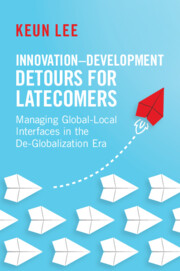Innovation–Development Detours for Latecomers
Many developing countries still face difficulties in initiating and sustaining economic development. Such difficulties have been exacerbated by the COVID-19 pandemic, resulting in an increasing divergence between rich and poor countries. For developing countries, one crucial question is whether to follow the trajectories of present-day rich countries or seek out different, new trajectories. Although this is a fundamental question, scholars offering mainstream prescriptions have not sufficiently explored it. Drawing on extensive empirical studies of firms and industries around the world, Innovation–Development Detours for Latecomers proposes an effective alternative to prevailing development thinking. It presents a rich menu of development pathways, including a new role for Schumpeterian states whereby they do not follow the paths of technological development already taken by advanced countries. Rather, they can skip certain stages and even create their own detours, thereby leapfrogging advanced countries in both manufacturing and service sectors. This title is also available as Open Access on Cambridge Core.
Keun Lee is Distinguished Professor at Seoul National University, Fellow of the Canadian Institute for Advanced Research (CIFAR), an editor for Research Policy, a regular writer for Project Syndicate, and the winner of the 2014 Schumpeter Prize and the 2019 Kapp Prize. He served as an economic advisor to the President of Korea, as the President of the International Schumpeter Society, and was a member of the UN Committee for Development Policy (CDP) and the World Economic Forum (Global Future Council).

